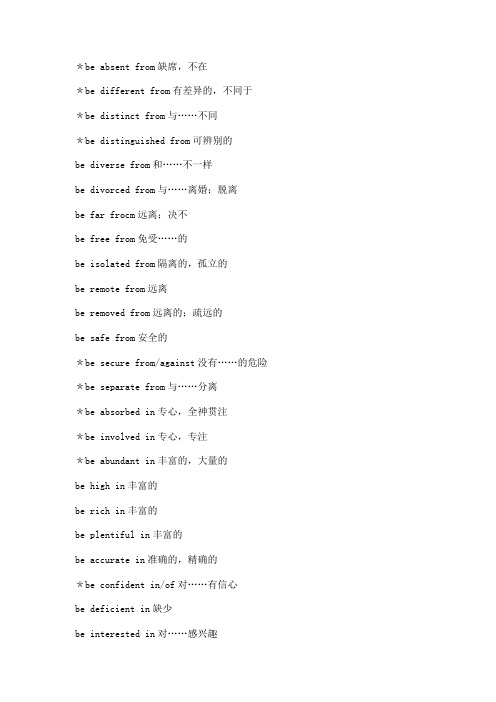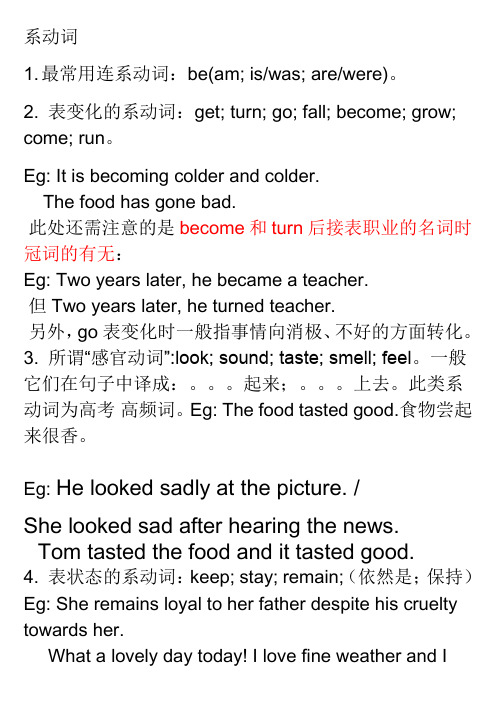常用系动词
- 格式:doc
- 大小:51.50 KB
- 文档页数:11

*be different from有差异的,不同于*be distinct from与……不同*be distinguished from可辨别的be diverse from和……不一样be divorced from与……离婚;脱离be far frocm远离;决不be free from免受……的be isolated from隔离的,孤立的be remote from远离be removed from远离的;疏远的be safe from安全的*be secure from/against没有……的危险*be separate from与……分离*be absorbed in专心,全神贯注*be involved in专心,专注*be abundant in丰富的,大量的be high in丰富的be rich in丰富的be plentiful in丰富的be accurate in准确的,精确的*be confident in/of对……有信心be deficient in缺少be interested in对……感兴趣*be proficient in熟练,精通be prompt in立即的,迅速的be punctual in准时的;按时的be qualified in胜任,合适be strict in sth.对某事严格be strong in擅长于be weak in薄弱的*be zealous in热心于be afraid of害怕be ashamed of为……惭愧,害臊*be aware of知道,意识到be born of出身于*be capable of能够,有能力be careful of要仔细,小心be careless of漫不经心的be cautious of小心谨慎的be certain of确信,有把握*be characteristic of特有的,独特的be clear of清除了,摆脱了*be conscious of意识到;知道*be considerate of体贴,为别人考虑*be critical of批评,谴责;感到不满be doubtful of对……怀疑*be economical of节俭,节省be empty of没有东西be envious of妒忌,羡慕be fearful of害怕,担心be fond of喜爱be free of免除;没有be frightened of害怕be full of充满*be guilty of内疚,犯(罪或过失)be hopeful of怀有希望*be ignorant of无知be impatient of不能忍受的*be independent of不信赖;与……无*be innocent of无罪,清白*be jealous of妒忌;爱惜be nervous of紧张,害怕be possessed of拥有,占有be proud of感到骄傲(自豪)be representative of代表be scared of害怕*be sensible of知道,意识到be short of缺乏……be shy of对……迟疑;有戒心*be sick of厌恶be sure of确信;对……有把握*be suspicious of怀疑……be terrified of受惊吓be thoughtful of深思;(常)想到be thoughtless of不考虑*be tired of厌倦,厌烦be true of对……适用;符合于*be typical of典型的,有代表性be uncertain of/about/as to对……不确定*be weary of对……厌烦be based on以……为基础*be bent on一心想,决心干……*be dependent on依靠,依赖be efficient on效率高,有能力be hard on严厉be heavy on对……严厉,严格*be intent on坚持要*be keen on喜爱,渴望be revenged on向……报复,报仇be rough on对人粗暴苛刻be accurate to准确,精确*be accustomed to习惯于*be adaptable to对……能适应be advantageous to对……有利*be agreeable to适合于;欣然同意*be applicable to可适用的*be beneficial to有利于,有益*be blind to视而不见be close to靠近;几乎be common to共同的be comparable to比得上的;可比的be contrary to与……相反be convenient to对……方便be cruel to残酷的*be dedicated to献身于,致力于be devoted to专心致力于;忠诚be engaged to与……定婚be entitled to给……权力(或资格)be equal to等于*be equivalent to相当于;等于*be essential to必不可少的,必要的*be exposed to暴露于*be faithful to忠实于be familiar to对……熟悉be fatal to致命的;具有毁灭性的be foreign to陌生,不熟悉be fundamental to必要的be gentle to温柔的*be grateful to感激的be harmful to有害的be helpful to有帮助的*be inclined to倾向于;常常*be identical to/with与……完全相同*be indifferent to对……漠不关心*be inferior to比……差,地位比……低*be superior to优于*be prior to在……之前*be previous to在……之前be junior to年幼于be senior to年长于be anterior to先于be posterior to(时间上)后于be kind to和蔼;友好*be liable to易于……的;可能*be loyal to忠诚于be married to和……结婚be necessary to必要的*be new to不熟悉,没有经验*be obliged to感激be open to开放的be opposite to相反的;对立的*be parallel to与……平行*be peculiar to……所特有的*be polite to有礼貌的*be preferable to更好的,更可取的be related to与……有关系be relative to和……相应,和……有关*be relevant to与……有关be responsible to sb. for sth.对……负责*be resistant to有抵抗力的;耐……的be rude to粗鲁的;无礼貌的*be sensitive to对……敏感be similar to与……类似,相似be strange to感到生疏*be subject to易于……的be suitable to适合be valuable to有价值的*be acquainted with认识某人,了解某物be angry with对某人生气be bored with对……厌烦*be busy with忙于*be comparable with可比较;比得上*be compatible with与……和谐共处;符合be concerned with与……有关;关心*be confronted with面临……*be consistent with与……一致;始终如一be consumed with被……吞食*be content with对……满足*be correspondent with与……相符be delighted with对……感到高兴*be faced with面临*be familiar with对……熟悉*be fed up with讨厌be filled with充满be frank with坦率be friendly with与……友好*be generous with/in大方,慷慨*be patient with有耐心*be popular with流行;为……所喜爱be satisfied with对……感到满意be scattered with散布,分布be seized with(疾病)侵袭be severe with严厉;苛刻*be strict with sb.对某人严格be stern with严厉;严格be thrifty with节省,节俭,简朴*be wrong with不正常;有毛病。

系动词1. 最常用连系动词:be(am; is/was; are/were)。
2. 表变化的系动词:get; turn; go; fall; become; grow; come; run。
Eg: It is becoming colder and colder.The food has gone bad.此处还需注意的是become和turn后接表职业的名词时冠词的有无:Eg: Two years later, he became a teacher.但Two years later, he turned teacher.另外,go表变化时一般指事情向消极、不好的方面转化。
3. 所谓“感官动词”:look; sound; taste; smell; feel。
一般它们在句子中译成:。
起来;。
上去。
此类系动词为高考高频词。
Eg: The food tasted good.食物尝起来很香。
Eg: He looked sadly at the picture. /She looked sad after hearing the news.Tom tasted the food and it tasted good.4. 表状态的系动词:keep; stay; remain;(依然是;保持)Eg: She remains loyal to her father despite his cruelty towards her.What a lovely day today! I love fine weather and Ihope it will stay fine for some more days.Much remains to be done.5. 表像系动词:seem; appear。
汉语意义:看起来像、似乎、好像。
这两个动词有一个共同的特点,即如果要表达时态的变化,需要后接不定时来完成。
Eg: He seemed to have caught cold./ When Father came in, Tom seemed to be eating something.句型转换也要要求牢记It seemed that he had caught cold.When Father came in, it seemed that Tom was eating something.6. 终止系动词:prove; turn out。

1)状态系动词用来表示主语状态,只有be一词,例如:He is a teacher.他是一名教师。
(is与补足语一起说明主语的身份。
)2)持续系动词用来表示主语继续或保持一种状况或态度,主要有keep, rest, remain, stay, lie, stand, 例如:He always kept silent at meeting.他开会时总保持沉默。
This matter rests a mystery.此事仍是一个谜。
3)表像系动词用来表示"看起来像"这一概念,主要有seem, appear, look, 例如:He looks tired.他看起来很累。
He seems (to be) very sad.他看起来很伤心。
4)感官系动词感官系动词主要有feel, smell, sound, taste, 例如:This kind of cloth feels very soft.这种布手感很软。
This flower smells very sweet.这朵花闻起来很香。
5)变化系动词这些系动词表示主语变成什么样,变化系动词主要有become, grow, turn, fall, get, go, come, run.例如:He became mad after that.自那之后,他疯了。
She grew rich within a short time.她没多长时间就富了。
6)终止系动词表示主语已终止动作,主要有prove, trun out, 表达"证实","变成"之意,例如:The rumor proved false.这谣言证实有假。
The search proved difficult.搜查证实很难。
His plan turned out a success.他的计划终于成功了。
(turn out表终止性结果)since的四种用法1) since +过去一个时间点(如具体的年、月、日期、钟点、1980, last month, half past six)。

情态动词和系动词专项复习一.连系动词连系动词又叫系动词,它不能直接作谓语,后面常跟形容词(作表语)构成系表结构表达完整的意义。
常见的系动词有:be, become, get, turn, grow, look, sound, smell, taste, feel, keep, seem, remain, stay, come, fall, go 等。
如:1)He looked very excited. 他看起来很兴奋。
2)Roses smell sweet. 玫瑰闻起来很香。
3)It's getting colder and colder. 天变得越来越冷了注意:系动词没有被动语态,一般不能用于进行时态。
二.情态动词情态动词本身具有一定的意义,但不能单独作谓语,后面必须跟动词原形一起构成谓语,表示说话人的语气、态度以及请求、愿望等。
它没有人称和数的变化(have to 除外)。
常见的情态动词有:can, could, may, might, must, should, would, need等。
1.can 的用法(1)表示能力,意为―能,会‖,否定式为can't,过去式为could。
如:—Can you dance?你会跳舞吗?—Yes, I can./No, I can't. 是的,我会。
/不,我不会I can skate.=I am able to skate.我会溜冰。
(2)表示请求、许可,此时与may 同义。
如:Can/May I borrow your umbrella? 我能借你的雨伞用吗?(3)表示客观可能性或推测,常用于否定句和疑问句中。
如:It can't be Mary. She has gone to the library. 那不可能是玛丽,她已经去了图书馆。
Can it be true?这可能是真的吗?注意:(1)can 与be able to 的区别:can 意为―能,会;可以;可能‖,只能用于一般现在时和一般过去时(could),没有人称和数的变化。

感官系动词我们把后面接主语补充成分的动词称为系动词。
1. 最常用的系动词是be,另外还有5个感官系动词,如:look(看上去),taste(尝上去),feel(摸起来),smell(闻起来),sound(听起来)等。
例如:The film is interesting. 这部电影很有趣。
The cookies smell delicious. 这些曲奇闻起来很香。
The soup tastes too salty. 汤尝起来太咸了。
The bed feels hard. 这床摸上去很硬。
The idea sounds quite good. 这个想法听起来非常好。
All the children look happy. 所有的孩子看起来都很开心。
上面用到的系动词smell,taste,feel,sound,look相当于汉语中的闻起来,尝起来,摸上去,听上去,看起来的概念。
2. 要注意这类系动词和系动词be不同,其否定形式和疑问形式的构成要借助动词do。
例如:The dishes do not smell very nice. 这些菜闻起来不太好。
Does he look worried? 他看上去担心吗?The cake does not taste very good. 这尝起来不太好。
现在完成时(一)1. 现在完成时定义:强调过去发生的动作对现在造成的影响或结果。
例如:Betty went to the park yesterday. (强调去公园的动作发生在昨天)Betty has been to the park before. (强调不仅去过公园,而且了解公园的状况)2. 现在完成时的谓语结构:have/has + 动词的过去分词例如:Ive always wanted to go on a dream holiday.句中的谓语结构为:have wantedLingling has visited the US.句中的谓语结构为:has visited3. 句式结构(1)肯定句式:主语+have / has+动词过去分词+其他。

初中英语系动词用法系动词又叫联系动词,是联系主语和表语的成分,有时候在句子中的意思不翻译,有的系动词也有实际的意义。
那么接下来给大家分享一些关于初中英语系动词用法,希望对大家有所帮助。
初中英语系动词用法:1、感官动词Feel, smell, sound, taste, touchThis flower smells very nice.2、状态系动词,表主语状态,只有beHe is a teacher.3、持续性动词,表示主语继续或保持一种状况或态度Keep, rest, remain, stay, lieHe always keeps silent at class.4、变化系动词, 表示主语变成什么样Become, grow, turn, fall, get, go, come, runHe became fat in winter holiday.其实很多系动词可以当系动词,也可以当实义动词,但用法有所不同。
如:LookLook at my hand 实义动词,看She looks amazing.系动词初中英语Be动词定义及用法:1、系动词+表语”的结构当be 动词做系动词使用时,主要构成“系动词+表语”的结构,在句子中做谓语。
表语可以是名词、形容词、副词、介词短语等。
例如:The man is a science teacher.Mary's new dresses are colourful.Mother is in the kitchen now.I have been there before.They shall be here at 10:00 tommorow.That can't be true.You are not being very polite.Your brother is being very annoying this evening2、be 动词的一般疑问句,方法是把be 移到主语前面,也可说成是移到句首。
常用系动词总结系动词是一类功能词,用于连接主语和谓语,表示某种状态、特性或属性。
常见的系动词包括be动词(am, is, are, was, were等)、seem、appear、feel、sound、look等。
以下是常用的系动词及其用法总结:1. Be动词(am, is, are, was, were等):Be动词是最常用的系动词,它表示主语和谓语之间的等同关系,并刻画主语的状态或特征。
be动词有多种形式,根据不同的时态和人称而变化。
例如:I am a student.(我是一名学生。
)He is tall and handsome.(他又高又帅。
)They were happy to see us.(他们见到我们很高兴。
)2. Seem:Seem指的是主语给人的印象或感觉,有些时候并不一定是真实的状态,通常用于描述主语的表面特征。
例如:She seems tired.(她看起来很累。
)The food seems delicious.(这个食物看起来很美味。
)3. Appear:Appear表示主语的外表或表现,但有时也会控诉主语的内在特征。
一般与look连用。
4. Feel:Feel表示主语的感受或感觉。
5. Sound:Sound指的是声音的特征,表示主语听起来是什么样子。
6. Look:Look表示主语的外貌或状态,一般用于形容人、事、物的视觉形态。
以上就是常用的系动词及其用法总结。
需要注意的是,系动词通常与形容词和名词连用,来描述主语的状态、特性或属性。
初中常用的12个系动词一、be系动词be系动词是英语中最常用的系动词之一,它有多种形式,包括am、is、are、was和were等。
be系动词用于连接主语和表语,表示状态、特征、身份、职业等。
例如,我们可以说:“I am tired.”(我累了。
)表示主语“我”处于“累”的状态。
二、becomebecome是一个常用的系动词,意为“变得”,用于描述一个人或事物从一种状态或身份转变为另一种状态或身份。
例如,我们可以说:“She has become a doctor.”(她已经成为一名医生。
)表示她从以前的身份转变为医生。
三、seemseem是一个常用的系动词,意为“似乎”,用于描述主语给人的印象或感觉。
例如,我们可以说:“He seems tired.”(他似乎很累。
)表示他给人一种疲倦的感觉。
四、looklook是一个常用的系动词,意为“看起来”,用于描述主语的外貌或表现。
例如,我们可以说:“The girl looks beautiful in the dress.”(这个女孩穿着这件裙子看起来很漂亮。
)表示这个女孩穿着这件裙子给人一种漂亮的感觉。
五、soundsound是一个常用的系动词,意为“听起来”,用于描述主语的声音。
例如,我们可以说:“The music sounds beautiful.”(这首音乐听起来很美。
)表示这首音乐给人一种美的感觉。
六、tastetaste是一个常用的系动词,意为“尝起来”,用于描述主语的味道。
例如,我们可以说:“The cake tastes delicious.”(这个蛋糕尝起来很美味。
)表示这个蛋糕给人一种美味的感觉。
七、smellsmell是一个常用的系动词,意为“闻起来”,用于描述主语的气味。
例如,我们可以说:“The flowers smell fragrant.”(这些花闻起来很芬芳。
)表示这些花给人一种芬芳的感觉。
八、feelfeel是一个常用的系动词,意为“感觉”,用于描述主语的触感或情感。
在英语中,动词的使用形式变化多样,与汉语语法截然不同,因此成为我们学习中的一大难点。
由近几年中考题可以看出动词为单项选择题的必考点,尤其是对动词短语的考查,偏向take、turn、put、down 等。
考查形式主要集中在三个方面:①同一动词+不同介词;②不同动词+同一介词;③不同动词+不同介词。
对动词的考查侧重感官系动词词义的辨析,也偶尔涉及实义动词的辨析。
设题形式均为简单句。
一、系动词系动词不能单独作谓语,必须跟表语一起构成谓语。
常用的系动词分类如下:(1)be动词:am, is, are, was, were(2)感官类:look, sound, smell, taste, feel(3)变化类:become, get, grow, go, turn(4)状态类:keep, stay二、助动词助动词本身没有词义,不能单独作谓语,只能和其他动词一起构成谓语,表示时态、语态、语气等特征,共同构成否定、疑问、强调、省略等句子。
主要的助动词有be, have, has, had, do, does, did, will, would 和shall等。
三、实义动词实义动词是能独立作谓语的动词。
按其语法作用分为及物动词和不及物动词;按其持续性可分为延续性动词和非延续性动词。
1.及物动词及物动词本身意义不完整,需要接宾语才能使其意思完整。
(1)动词+宾语如:Can you open the window?(2)动词+宾语+宾补如:We call him Bill.I saw Tom play in the park yesterday.注意:用省略to的不定式或现在分词作宾补的动词有make, let, see, watch, hear, notice等。
(3)动词+间接宾语+直接宾语如:May I ask you a question?Please pass me the book.常见的带双宾语的动词有:give, bring, buy, get, lend, offer, pass, teach, tell, write, return等。
英语常用连系动词连系动词也称系动词(Link Verb),它本身具有实在意义,但不能单独作谓语,后边必须加上表语共同构成复合谓语。
连系动词与其后面的表语合起来叫作系表结构。
系表结构主要是为了说明主语的状况、性质、特征等情况。
一、表示状态的系动词用来说明主语的状态,只有一个be,但be在不同的人称和时态中有不同的形式,有am、are、is、was 和were ,后接名词、形容词、分词、不定式、副词和介词短语等作表语。
例如:The man is a science teacher.Mary's new dresses were colorful.二、表示持续性的系动词用来表示主语继续或保持一种状况或态度,主要有keep、remain、stay、lie、stand、continue和rest等,例如:Please keep quiet.Several problems remain to be solved.I hope the weather will stay fine.The whole city lay in ruins after the earthquake.Mr. Black stands high in the public estimation.The weather continues cold.My grandfather will never rest idle.三、表“像”系动词用来表示“看起来像”这一概念,主要有seem、appear和look,例如:She seems very happy with the new job.He appeared to be talking to himself.She looks happy.四、感官系动词感官系动词主要有feel、smell、sound、taste等,后面接形容词作表语,说明主语所处的状态,其意思分别为“摸/闻/听/尝起来……”。
这几个动词的主语往往是物,而不是人。
例如:The tomatoes feel very soft.These flowers smell very sweet.The music sounds very pleasing to the ear.The meat tastes delicious.五、表示变化的系动词这些系动词表示主语变化成什么样,主要有become、grow、turn、fall、get、go、come和run等,这些词后面大多数接形容词作表语,但become, turn, sound, remain, seem亦可接名词作表语,只是turn 若跟名词则不加冠词。
例如:She became a famous writer.His cold is growing worse.In autumn the leaves turn yellow.They first met at university and later fell in love.It's getting cold.The milk went sour.My shoe came loose.The river was beginning to run dry.He turns doctor. = He becomes a doctor.六、表终止的系动词表示主语发出的动作已经终止,主要有prove和turn out,表达“证实”和“变成”之意。
例如:My advice proved( to be) wrong.He proved a competent manager.The party turned out (to be )very successful.The rookie turned out (to be) the best hitter on the team.七、学习系动词的注意事项1.特别要注意“be+过去分词”所构成的系表结构与其所构成的被动语态的区别。
系表结构侧重于表示主语的特征或所处的状态,通常没有由by引导的介词短语,如:The door was closed. 被动语态侧重于强调主语是谓语动词所示动作的承受者,表示动作;句中可以用由by引导的介词短语。
如:The door was closed by me.还要注意由“be+ V-ing”所构成的系表结构与其所构成的进行时态的区别。
系表结构侧重于说明主语具有的特征或存在的状态,也可说明主语是什么。
如:My job is teaching English. 进行时态侧重于强调主语正在做某事。
如:Mr. Wang is reading an evening paper now.2.要特别注意某些动词既可以做系动词,又可以做实意动词的用法。
有些系动词也是实意动词,该动词表达实义时,有具体词义,可单独作谓语,例如:He fell ill yesterday.He fell off the ladder.The newly-invented soft drinking tastes quite unique.The chef is tasting the fish carefully.3.系动词除了接名词、形容词、分词、不定式、副词和介词短语等以外,还可接以下几种表语形式:①能接as if/as though表语从句的系动词有:look(看起来),smell (闻起来),sound(听起来),feel(觉得);appear(显得),seem (似乎)等。
例如:He looked as if he had just stepped out of my book of fairy tales.She seemed as if (though) sh e couldn’t understand why Laura was there.It sounds to me as though there’s a tap running somewhere.She felt as if her head were splitting.The river appeared as if enveloped in smog.②可用于“It+系动词+that从句”结构的有:seem和appear不可用be、look。
如:It seemed that he had made some serious mistakes in his work.It appeared that he was talking to himself.③能用不定式作表语的系动词有be、seem、get、look、appear、prove、grow等。
Her job is to look after the children.He seems not to go with us.She looks to be a young girl of twenty.He didn’t appear to dislike it.My advice proved to be wrong.He will grow to like this work gradually.④能与there连用的系动词有:be、appear和seem. 如:There appeared to be only one room.There seems(to be)no need to go.⑤能接介词短语的有:feel, look, sound, taste, remainIt sounds like a train going under my room.The concert remains in my memory.4.系动词一般不用进行时。
5.系动词无被动语态。
练习:1. The drug __________ (to be) highly effective.A. turnedB. becameC. provedD. smelled2. How sweet the music __________!A. soundsB. looksC. remainsD. is3. The big soldier __________ there except for his slightly moving lips.(B)A. kept calmB. stood stillC. was quietD. lay silent4. This afternoon will be cloudy, _____ clear.A. feelingB. tastingC. fallingD. turning5. The actress is thirty-five years old, but she ___ a lot younger.(B)A. looksB. appearsC. seemsD. feelsHe appears quite young.他显得年轻。
6. He ____ pale and his clothes were in a frightful state.(A)A. lookedB. appearedC. seemedD. was looked7. His dream to be admitted into Beijing University has ______ true at last.(D)A. becomeB. turnedC. grownD. come8. The silk made in Suzhou ___ smooth and soft.(C)A. is feltB. is touchedC. feelsD. is feeling9. Things _____ to be exactly as the professor had foreseen.(A)A. turned outB. turnedC. were provedD. showed10. Holding the note in his hand,Adam _____ there dumbfounded.(D)A. remainedB. stayedC. keptD. stood11. Sarah, hurry up. I'm afraid you can’t have time to ______ before the party.(A)A. get changedB. get changeC. get changingD.get to change12. -- I was wondering if we could go skiing on the weekend.-- _________ good.A. SoundB. SoundedC. SoundingD. Sounds13. It remains ________ whether Jim will be fit enough to play in the finals.(B)A. seenB. to be seenC. seeingD. to see14. The melon the Smiths served at dinner would have tasted if it had beenput in the fridge for a little while.A. goodB. betterC. bestD. well15. Please remain _________ until the plane has come to a complete stop.A. to seatB. to be seatedC. seatingD. seated1-5 CABDB 6-10 ADCAD 11-15 ADBBD1. The story sounds___________.A. to be trueB. as trueC. being trueD. true2. Those oranges taste __________.A. goodB. wellC. to be goodD. to be well3. –Are you feeling____________. (B)--Yes. I'm fine now.A. any wellB. any betterC. quite goodD. quite better4. –Do you like the material?--Yes it __________ very well.A. is feelingB. feltC. feelsD. is felt5. –You don't look very__________. Are you ill?--No I'm just a bit tired.A. goodB. wellC. strongD. healthy6. The man we followed suddenly stopped and looked as if _______ whether he was goingin the right direction.A. seeingB. having seenC. to have seenD. to see7. –How long ___each other before they ____ married?--For about a year.A. have they known, getB. did they know were going to, getC. do they know are going to, getD. had they known, got8. Cleaning women in big cities usually get ___ by the hour.A. payB. payingC. paidD. to pay9. As we joined the big crowd I got ____ from my friends. (A)A. separatedB. sparedC. lostD. missed10. –How are the team playing?--They are playing well but one of them _____hurt.A. gotB. getsC. areD. were1-10 DABCB DDCAA11。